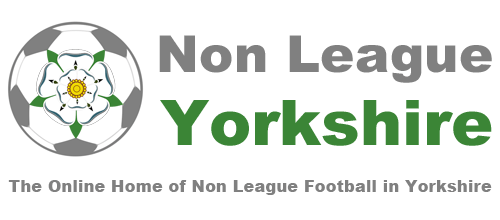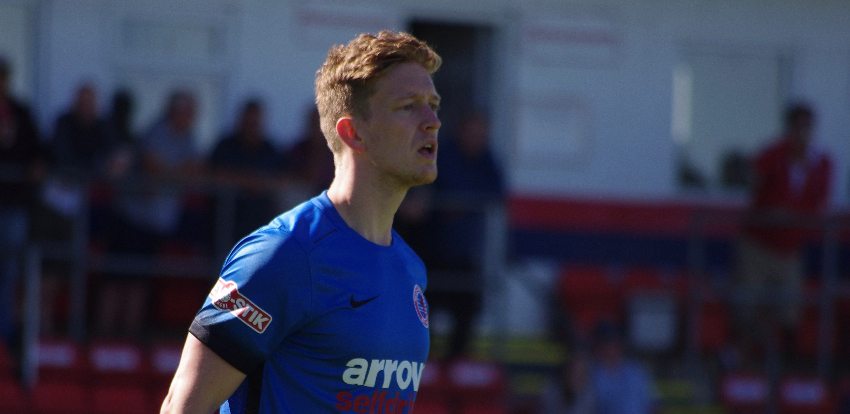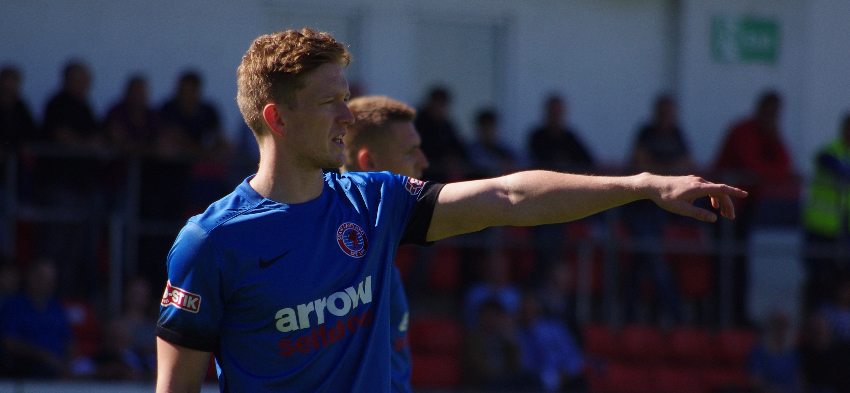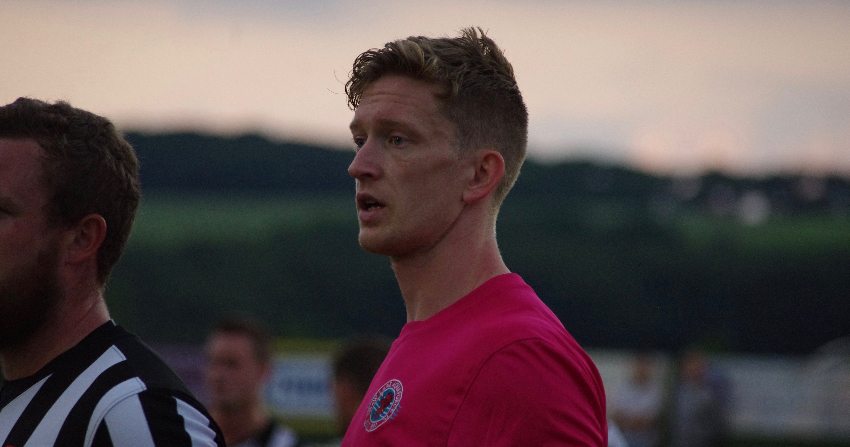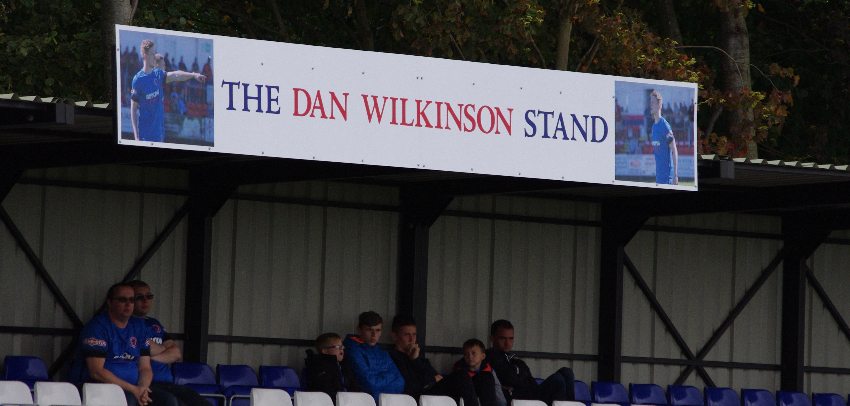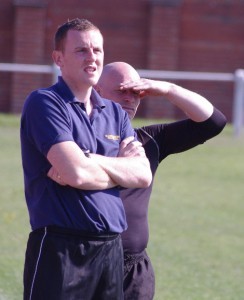
In the latest ‘My Greatest Game’ article, Boston United chief and Non League Yorkshire’s manager of the decade Craig Elliott reflects on his early managerial career which culminated in guiding Glasshoughton Welfare to promotion to the NCEL Premier Division on the dramatic final day of the 2011-12 season.
Part Two will be published later in the week with Craig reflecting on his glory-laden spell in charge of Shaw Lane Aquaforce.
AFC Emley (Scott Holt 22, Paul Banton 60) 2-3 Glasshoughton Welfare (Sean Hazelden 68 OG, Steven Bennett 84, 89) – 28th April 2012
The Team
Glasshoughton Welfare: Saynor, Lloyd, Corbett, Booth, Sykes (captain), Hitchings, Catton, Darley, L Bennett, Radford, Fothergill. Subs: Seed, S Bennett.
“Non League football has been part of my life since I was seven or eight because my dad Ged played for Pontefract Collieries and then managed them. He was also the assistant manager at Glasshoughton.
“I actually remember watching my first Pontefract game. I think it was Guiseley and it was a big game because Guiseley were near the top and someone called Dean Walling scored. People may remember him because he went onto play in the League. I remember it because he scored a header outside the 18-yard box which I had never seen before. Pontefract had people like Andy Butterwick who was a big physical centre-back and was captain. Dave Penney played for them too.
“I’m a bit of a Non League geek and I’ve got programmes from back then in my loft. I still collect programmes from my games now, I’ve got boxes full. I’m been looking through them this week. Jason Ainsley the manager of Spennymoor was on one of them and I remember watching him play years ago which is strange considering he’s a fellow manager. He was a good player. I remember Dean Windass playing for North Ferriby at Pontefract.
“I didn’t know when I was watching my dad play that I wanted to be a manager, but I did keep books from an early age where I used to keep stats like tackles, shots. Who the strikers were in the league because I was a striker myself. I had a book of all teams, not just Pontefract, but who I thought were the best players in the league. I used to enjoy watching the opposition as much as my dad’s team.
“I watched Leeds United a bit with my uncle, but I enjoyed going to the Non League games more because I used to go in the dressing rooms and go to training. I loved the atmosphere and being closer to the action appealed to me from a young age.
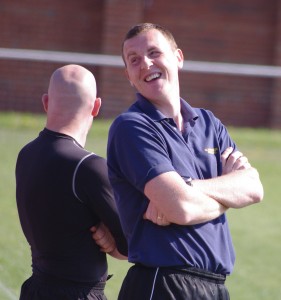
“I went onto play for Glasshoughton and then Harrogate Town and I was doing really well there, but I got a bad injury. I had 12 months of depression where I couldn’t play. I signed for Brian France at North Ferriby, but my body couldn’t cope. I had been on trial at Grimsby and I thought I was going to do well. I had 18 months of injures and it was when I was 26 that I realised that every-time I try to come back my body was not working. I had an achilles operation and had two years of moping about and I had probably fell out of love with football, but then I decided to get back into it. That’s when I did my coaching badges.
“I was around 27 and Pontefract Colls started a new reserve team in the competitive Lancashire League. I thought that I’d see if I fancied it because I had a lot of knowledge about Non League Football and I’d seen my dad manage. I think I took it because I was totally missing playing football. It escalated from there. We did really well in a hard league and I probably did the hard yards. We were going to places like Stalybridge Celtic and Hyde, top teams at the time and it was difficult to compete, but we did compete with a lot of young lads. I loved it and gave me a taste for more. I did well, but I think if I had done poorly, it could have gone another way. I enjoyed the adrenaline of winning games and trying to get players.
“I then realised that I wanted to go to a first team role and I heard that Kellingley were after a manager. They had been relegated into the First Division of the West Yorkshire League and I just thought ‘give it a go’. We had an unbelievable season because we won three or four trophies.
“I moved to Glasshoughton two weeks before the 2010/11 season because Stuart Waddington had left to go to Liversedge. I had shown interest when he got the job the previous year. Glasshoughton weren’t winning many games at the time and had finished rock bottom. I probably wasn’t ready and fate is a big thing.
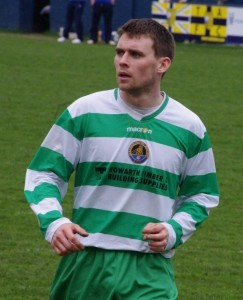
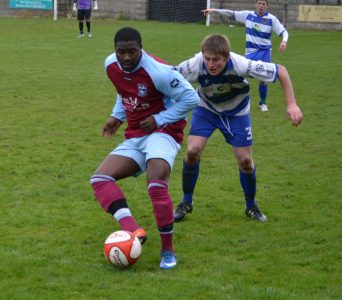
“By now with Kellingley we had the best team locally. We actually beat Glasshoughton and Pontefract in the local cups and my name was getting out there. We had a really good team with Dave Dickinson and Andy Seed, people like that. I was in a good position to get the job and we did well. We finished seventh and won the Wilkinson Sword Trophy. I was thrown in the deep end at the beginning and we actually played the favourites Handsworth and we were scraping around for a team and we got beat 4-0 on the first day. I was thinking ‘wow’. It was difficult initially.
“But I always had a player database and I was lucky that I had a few young lads on my radar like Josh Corbett and Andy Seed. They gave me the base to build from. The biggest signing that season was Paul Banton, who sadly passed away recently. He was my captain and he made a massive difference and it was the turning point. Getting players like him helped me add to the side and I attracted people like Paul Sykes.
“It is important for any manager to go and watch games. I’ve done that all levels and I still do that now. If there is a game on, I’ll go. I’ve done it since day one. That’s my tip for any young manager. You have to work harder than other managers and for me that’s watching games. Not just for the opposition and players, but for different tactical things and that’s from League Two football to Sunday morning football. I used to spend a fortunate paying to go watching matches. Some of the travelling I used to do was unbelievable. I used to go and watch North East teams because at that time I was a big fan of them, the Darlington’s and Spennymoor’s. I once went to watch West Auckland because they had done well in the FA Vase. I’ve always gone to see teams who are doing well to see why they are doing well.
“I never got paid for managing either until I had been at Shaw Lane for 18 months. When I was at Glasshoughton we had such a low budget. I think we were paying £5 to players at one point, you’d have been better off not paying players. It sounds ridiculous. But I genuinely think you can’t get paid early in your management career. You have to get your hands dirty in the early years and learn from your mistakes. I refused to take any wages at Ossett and when I went to Shaw Lane, I didn’t take any wages for 18 months because I wanted my wage to be inserted in the playing budget because I was so hungry for success. You think at the time ‘am I doing the right thing’, but long term you hope it pays off.
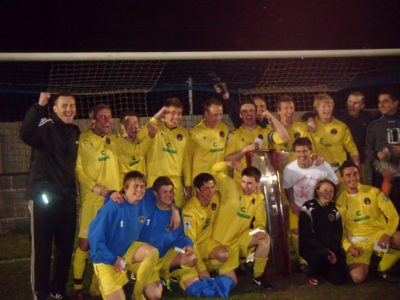
“That first season at Glasshoughton was a huge achievement. We won a cup and that hadn’t happened at Glasshoughton for a long time and it gave us the momentum to try and win promotion the following season.
“We started the season well and we went unbeaten until the middle of October. But had a few disciplinary problems at the start. We played Louth in August and we scored a last minute equaliser, but had three players sent off after the celebrations. We had a fiery team with Sam Dobbs in the net. He was one of the players sent at Louth, but that was my fault as I brought a rule in that when we score the entire team has to celebrate. He actually got a second booking for celebrating. I think Carl Fothergill got sent off as well. Part of our make-up was that we were a strong physical side, but we had a winning mentality as well. Maybe as a young manager you fire up your lads too much and again that’s a learning curve where you need to get the balance right and at the time it wasn’t. We had Bobby Madley come in to talk to us, but we sorted it out pretty quickly. It would have cost us if we hadn’t.
“The season then went pretty well. But then we had a little wobble and we lost to Rossington and with four games to go it looked like we had blown it and would miss out on promotion. However, we had a lot of firepower and we went back to trying to score goals rather than defend leads if that makes sense. We went on the front foot with people like Liam Radford. We also had quality players in the likes of Anthony Lloyd and Lee Bennett. His brother Steven scored some vital goals for us. Andy Catton was also a big player for us. They are the type of players who gave us that class to get us over the line.
“Because we had four tough remaining games against Handsworth, Grimsby, Handsworth again and then Emley, that is the reason why it was an unbelievable end to the season. We beat Handsworth and Grimsby and then we went to Handsworth on a Friday night and we won 1-0 with Josh Corbett scoring an unbelievable goal. We had played for 80 minutes with ten men after Chris Hitchings was sent off. Handsworth could have won the league that night and they had arranged for a party to celebrate which obviously was cancelled. That night Paul Sykes was immense at centre-back. What a career he had.
“So it moved to the Emley game and at the time it was the biggest game of my managerial career. We had put so much effort in physically and mentally that season it was so important that we won the game to deservedly in my eyes to go up. But Emley were a decent outfit so it was a very tough game.
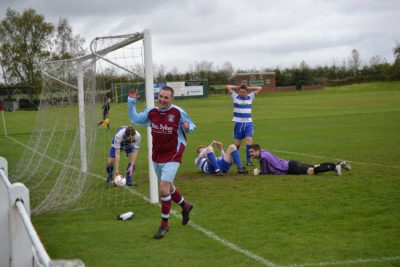
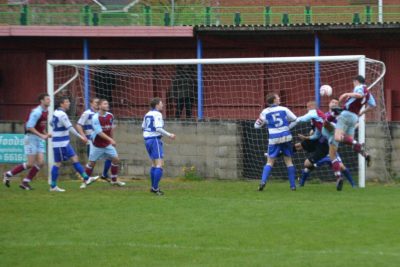
“We had to win to guarantee promotion. The permutations were fairly straight-forward as Handsworth were playing Worksop Parramore. A point may have good enough, but we weren’t taking chances. There was nerves there and there was going to be because we’d worked all season and it was boiling down to one game where all you have to do is win it to get promoted.
“I remember us not starting too well and maybe looking nervous. We were getting overrun in midfield and at half-time Emley were winning.
“The message at half-time was about being positive. We scored a lot of goals that season so we were always a threat. So it was about throwing caution to the wind and going for it. It is easy to say, but there was only 45 minutes left of the season so there was no point trying to slowly get into the game.
“But then Paul Banton, our former captain who I had let go, made it 2-0 and I thought it was fate. It looked like our hopes were over. The one saving grace was that we still had a lot of talent on the pitch.
“So we brought Steven Bennett and Andy Seed on. Steve came to throw more caution to the wind and to hope him and his brother Lee could combine. Seedy has been an unbelievable captain for me and we wanted his leadership skills on the pitch. His bit of leadership and Steven Bennett’s bit of quality with his brother Lee helped us get the goals we needed.
“We got it to 2-2 and we felt we simply had to win. When you think about the year, it was before Twitter took off in the NCEL so information was limited. I was getting mixed messages about Handsworth and Worksop from people coming up to the dugout. Myself, Darren Smith and Simon Houghton agreed that day ‘let’s just win the game’. When it was 2-2 we were in the ascendancy and we were all over them. It was just whether we could get that last goal. Thankfully we did through Steven Bennett in the last minute. I don’t remember the build-up to the winner. All I remember is me and Daz somehow being in the middle of the pitch cuddling each other. The way it was done was so special.
“There was so much emotion. I was in my early days of winning promotions and it was such a great feeling to see our hard work come off. We were a small club and it was a great reward for all the people behind the scenes to see the club win promotion. We didn’t have much for resources and we were lucky to get a few players, but it worked. I remember being shattered and going out that night thinking ‘thank god we have done that’.
“It is up there with all my achievements. As a young manager I was learning on the job and for it to come off and win promotion, it is right up there because it gave me the appetite to carry on.
“I didn’t know at the time it would be my last game in charge of Glasshoughton. But I was ambitious and it was the right time to leave when Ossett Town approached me a few weeks later. I’ve done one good thing in my career in that I’ve known when jobs are done and when I have taken clubs as far as I can. I can look back at my time at Glasshoughton with fond memories. Taking the club any further would have been really difficult.”
Craig Elliott was interviewed by James Grayson.
